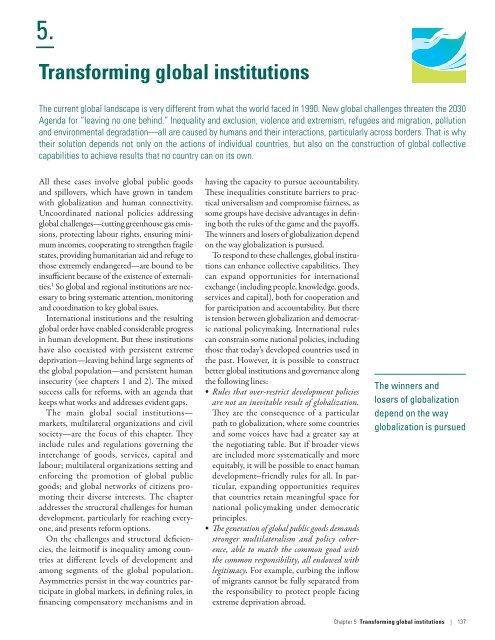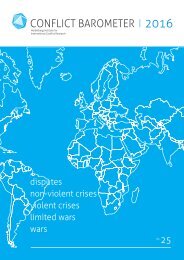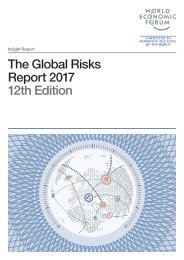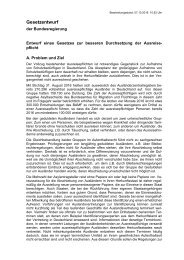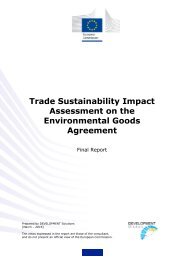Human Development Report 2016
6Tyccfrzw
6Tyccfrzw
You also want an ePaper? Increase the reach of your titles
YUMPU automatically turns print PDFs into web optimized ePapers that Google loves.
<strong>Human</strong> <strong>Development</strong><br />
5.<br />
<strong>Report</strong> <strong>2016</strong><br />
<strong>Human</strong> <strong>Development</strong> for Everyone<br />
Transforming global institutions<br />
The current global landscape is very different from what the world faced in 1990. New global challenges threaten the 2030<br />
Agenda for “leaving no one behind.” Inequality and exclusion, violence and extremism, refugees and migration, pollution<br />
and environmental degradation — all are caused by humans and their interactions, particularly across borders. That is why<br />
their solution depends not only on the actions of individual countries, but also on the construction of global collective<br />
capabilities to achieve results that no country can on its own.<br />
All these cases involve global public goods<br />
and spillovers, which have grown in tandem<br />
with globalization and human connectivity.<br />
Uncoordinated national policies addressing<br />
global challenges — cutting greenhouse gas emissions,<br />
protecting labour rights, ensuring minimum<br />
incomes, cooperating to strengthen fragile<br />
states, providing humanitarian aid and refuge to<br />
those extremely endangered — are bound to be<br />
insufficient because of the existence of externalities.<br />
1 So global and regional institutions are necessary<br />
to bring systematic attention, monitoring<br />
and coordination to key global issues.<br />
International institutions and the resulting<br />
global order have enabled considerable progress<br />
in human development. But these institutions<br />
have also coexisted with persistent extreme<br />
deprivation — leaving behind large segments of<br />
the global population — and persistent human<br />
insecurity (see chapters 1 and 2). The mixed<br />
success calls for reforms, with an agenda that<br />
keeps what works and addresses evident gaps.<br />
The main global social institutions —<br />
markets, multilateral organizations and civil<br />
society — are the focus of this chapter. They<br />
include rules and regulations governing the<br />
interchange of goods, services, capital and<br />
labour; multilateral organizations setting and<br />
enforcing the promotion of global public<br />
goods; and global networks of citizens promoting<br />
their diverse interests. The chapter<br />
addresses the structural challenges for human<br />
development, particularly for reaching everyone,<br />
and presents reform options.<br />
On the challenges and structural deficiencies,<br />
the leitmotif is inequality among countries<br />
at different levels of development and<br />
among segments of the global population.<br />
Asymmetries persist in the way countries participate<br />
in global markets, in defining rules, in<br />
financing compensatory mechanisms and in<br />
having the capacity to pursue accountability.<br />
These inequalities constitute barriers to practical<br />
universalism and compromise fairness, as<br />
some groups have decisive advantages in defining<br />
both the rules of the game and the payoffs.<br />
The winners and losers of globalization depend<br />
on the way globalization is pursued.<br />
To respond to these challenges, global institutions<br />
can enhance collective capabilities. They<br />
can expand opportunities for international<br />
exchange (including people, knowledge, goods,<br />
services and capital), both for cooperation and<br />
for participation and accountability. But there<br />
is tension between globalization and democratic<br />
national policymaking. International rules<br />
can constrain some national policies, including<br />
those that today’s developed countries used in<br />
the past. However, it is possible to construct<br />
better global institutions and governance along<br />
the following lines:<br />
• Rules that over-restrict development policies<br />
are not an inevitable result of globalization.<br />
They are the consequence of a particular<br />
path to globalization, where some countries<br />
and some voices have had a greater say at<br />
the negotiating table. But if broader views<br />
are included more systematically and more<br />
equitably, it will be possible to enact human<br />
development–friendly rules for all. In particular,<br />
expanding opportunities requires<br />
that countries retain meaningful space for<br />
national policymaking under democratic<br />
principles.<br />
• The generation of global public goods demands<br />
stronger multilateralism and policy coherence,<br />
able to match the common good with<br />
the common responsibility, all endowed with<br />
legitimacy. For example, curbing the inflow<br />
of migrants cannot be fully separated from<br />
the responsibility to protect people facing<br />
extreme deprivation abroad.<br />
The winners and<br />
losers of globalization<br />
depend on the way<br />
globalization is pursued<br />
Chapter 5 Transforming global institutions | 137


